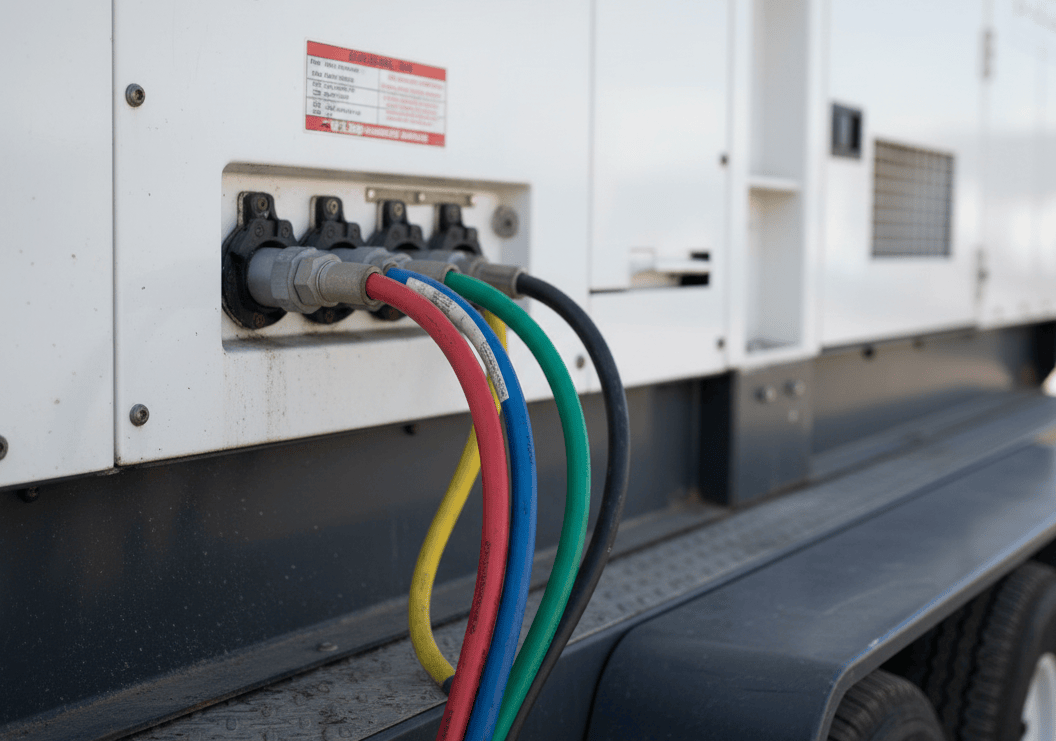

Power cables are the backbone of any temporary or permanent power system. Also called heavy-duty generator cables or generator connection cables, they carry electricity from generators to the equipment and facilities that need it.
Power cables are the backbone of any temporary or permanent power system. Also called heavy-duty generator cables or generator connection cables, they carry electricity from generators to the equipment and facilities that need it. Without quality cables, even the most powerful generator becomes useless. Understanding what these cables are and how they work helps you choose the right equipment for your needs.
Power cables are thick, heavily insulated conductors that transmit electrical current from generators to distribution points. Unlike the thin household extension cords most people know, heavy-duty generator cables are engineered to handle massive amounts of electrical current continuously.
Each cable contains multiple copper or aluminum strands twisted together inside thick protective insulation. The conductor material—usually copper—allows electricity to flow with minimal resistance. More strands mean more current capacity. Thicker cables can deliver power to larger distances without losing voltage.
The insulation surrounding the conductors protects against damage and electrical hazards. Industrial-grade insulation withstands harsh environmental conditions, extreme temperatures, and physical abuse. Cables designed for outdoor use handle rain, UV exposure, and temperature swings without degrading.
Power cables are rated by their amperage capacity. A 400-amp cable can safely carry 400 amperes of electrical current. A 600-amp cable handles more power. The amperage rating determines what size equipment the cable can safely power.
Voltage rating is equally important. Most industrial cables are rated for either 480 volts or 600 volts. The voltage rating must match your generator output and the equipment being powered. Using a cable with insufficient voltage rating creates safety hazards and damages equipment.
Cable length affects performance. Longer cables experience voltage drop—the voltage decreases as electricity travels down the line. A 500-foot cable causes more voltage drop than a 50-foot cable carrying the same current. This is why temporary power installations require properly sized cables for their specific distances.
Temporary power systems typically use flexible cables that connect generators to transfer switches or distribution panels. These cables have heavy rubber or synthetic insulation that withstands outdoor conditions and physical handling. Workers walk on them, equipment rolls over them, and they get coiled and uncoiled repeatedly.
Permanent installations may use fixed cable runs that are installed once and rarely moved. These cables often have different insulation types optimized for their specific environment.
Marine-grade cables designed for ships and offshore platforms handle saltwater environments that corrode standard cables. Mining cables endure underground conditions with moisture, vibration, and dust. Different applications require different cable constructions.
Power cables connect to generators through heavy-duty connectors. These connectors must maintain secure contact and handle the electrical load without overheating. Poor connections cause heat buildup, melting insulation, and potential fires.
Connectors come in standardized sizes. A 400-amp connector is larger than a 200-amp connector. This prevents someone from accidentally connecting a large cable to a small connector or vice versa. The standardization adds a safety layer.
Ferrules and lugs at each end of the cable attach to connectors and terminals. These terminal connections are crimp-sealed or soldered to ensure they don't come loose. Loose connections are one of the most common causes of power system failures.
Professional-grade power cables meet strict industry standards. Cables manufactured for commercial and industrial use are tested to ensure they perform under specification. They have documentation proving their amperage and voltage ratings.
Cheaper cables don't meet these standards. Undersized conductors, poor insulation, or inadequate connectors create fire hazards and equipment damage. Investing in quality cables saves money in the long run by preventing failures and dangerous situations.
Cable insulation must resist heat, moisture, and physical damage. Cheap insulation cracks and peels away, exposing live conductors. This creates electrocution hazards for anyone working nearby. Quality cables maintain their insulation integrity for years of service.
PTS Rentals supplies power cables manufactured by Trystar, a respected manufacturer of heavy-duty electrical equipment. As a licensed reseller, PTS Rentals offers both new and used Trystar cables.
New cables provide complete peace of mind. They arrive in original condition with full documentation and warranty coverage. For customers wanting brand-new equipment, new cables guarantee maximum performance and reliability.
Used cables offer cost savings for budget-conscious buyers. Pre-owned Trystar cables have been professionally inspected and tested. They perform identically to new cables at a lower price point. Used cables work well for temporary projects or installations with budget constraints.
Whether new or used, Trystar cables are engineered for performance. Trystar manufactures cables for the rental industry specifically. They understand the demands of temporary power systems and build cables that withstand those demands.
Selecting power cables requires matching cable specifications to your installation. You need the correct amperage rating, voltage rating, and length. A cable that's too small won't deliver adequate power. A cable that's too long causes unacceptable voltage drop.
Site conditions matter too. Outdoor installations need cables with UV-resistant insulation. Areas with extreme temperatures require cables rated for those temperature ranges. Marine environments need corrosion-resistant construction.
PTS Rentals helps customers select appropriate cables for their specific applications. The company's licensed reseller status and experience with Trystar products means their team understands cable specifications and can recommend suitable options.
Quality cables last for years with proper care. Storing cables indoors protects insulation from UV damage. Coiling cables properly prevents kinks and damage to conductors. Regular inspection catches wear before it becomes dangerous.
Power cables are essential equipment that directly affects power system safety and performance. Choosing quality cables manufactured by reputable companies like Trystar ensures your power system operates reliably. PTS Rentals provides both new and used Trystar cables, giving you options that fit your needs and budget.